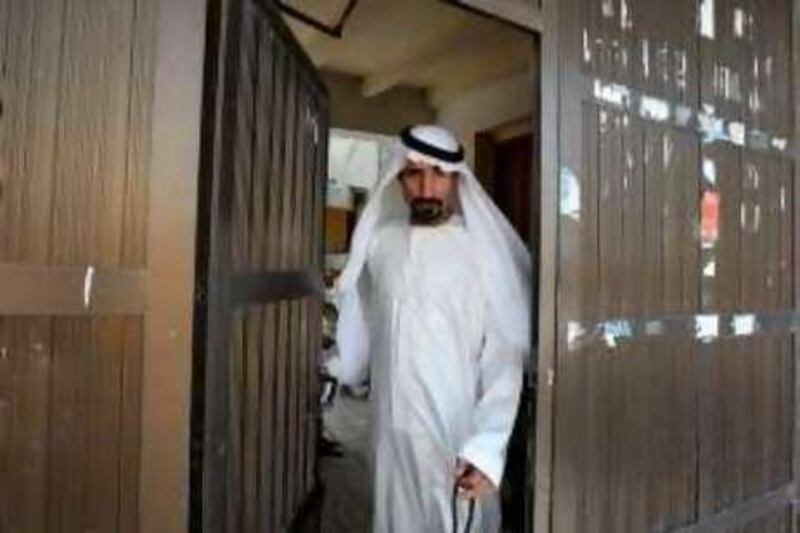DUBAI // When Dubai's economy began to stir in the first decade of the last century, Mohammed Hussein Abdullah's ancestors decided to settle in the fledgling city. As nomadic bedouin traders from the Bani Qitab tribe, they had for centuries inhabited the vast spaces of the aeolian sands that cover most of the UAE's territory.
They settled because Dubai offered them more economic stability than the uncertainty of the desert, and they believed it would give their children a better future. With nomadic groups from other tribes they earned their living as inhabitants of Dubai by herding, hunting, fishing and, most of all, from pearling. But when statehood came to the UAE in the early Seventies, they had nothing to prove they were native inhabitants and were classified as bidoon - people who are technically stateless by accident of history or more recent misfortune.
Now, however, seated in his home in Satwa, Mr Abdullah held up a document he had just received from the Department of Naturalisation and Residency. "Me and my family have been given our first passports - we will collect them this week and this document proves it," he shouted. For Mr Abdullah it is the end of a decades-long headache. "I had been worried about my children and their status. "Although they have had an education, their status is finally confirmed and I can look to a brighter future for them," he said.
Surrounded by his wife and three of their sons, Mr Abdullah, who is 52 and unemployed, said he had been trying to clarify his family's status since 1979. "I am from here," he said. "I belong here and I have proved it, but it has been difficult because I never had any documents from my parents or grandparents who all have lived in this house for decades before me." Like many bidoon his parents and grandparents did not see the need for IDs and documents, which they considered contrary to the way they wanted to live their lives - a decision that cost Mr Abdullah.
As the UAE was formed and its borders were defined on Dec 2, 1971, Mr Abdullah's parents and thousands of others who did not carry identification were left stateless and dismissed as bidoon, meaning "without" in Arabic. The Government says there are 10,000 bidoon in the UAE, although the human rights group Refugees International believes the real figure could be much higher. Without documentation or nationality, their rights and their ability to travel, get jobs, obtain suitors and access benefits enjoyed by UAE citizens are restricted.
In October 2006, the Government issued directives aimed at finding solutions for the bidoon. The Supreme Federal Council gave the green light for the naturalisation of the first group of 1,294 people, but like Mr Abdullah they were generally dealt with on a case-by-case basis. Now, however, the Government has committed itself to finding a wide-ranging inclusive solution for the bidoon issue. This week the Ministry of Interior announced the formation of a committee to assess the status of all bidoon in the UAE, with a view to naturalising those who are eligible. From Sunday, every stateless person in the country will have 60 days to register, or face prosecution.
The Government says the move is intended to recognise the rights of those who deserve citizenship and protect national security. According to Maj Gen Nasser Lakhribani al Nuaimi, director general of the Minister of the Interior's Office, a growing number of people are trying to enter the country illegally and join the "ranks of the undocumented". Bidoon, who are scattered across the Gulf States, historically originate from Iran, Iraq, Syria, Saudi Arabia and other Gulf states.
Some are Bedouin by origin like Mr Abdullah's family. They lack documentation or official status because many of them were merchants who led itinerant lives plying the major trade route through the emirates in the late 19th and early 20th Centuries, but then settled in towns that were constantly growing and developing. At that time there were no borders, no passport control and no system of registering and recording births. It was a tribal system.
"Many didn't resolve their status at the time because of illiteracy and not knowing and understanding what was going on around them," said Mr Abdullah. It was a very simple life and people did not see the importance of keeping paperwork or filing the correct documents with the Government to determine their status, he said. "This is why all my children have been educated so they won't fall short in this life."
Ahmed, a bidoon who has been a police officer in Sharjah for more than 30 years, said he was hopeful his family would get recognition and better access to education, health services and travel outside the country. "I am already ageing, but my concern is about the future of my eight children. I want them to live happily like other people," he said. He said bidoon had worked hard to get recognised. His eight children had been unable to get citizenship although their mother is an Emirati. "At first the children had passports and birth certificates but they were not renewed since they could not prove their grandfather's lineage in the country," Ahmed said.
Now he is hopeful that like Mr Abdullah he will be among the bidoon who will at last enjoy security and stability as citizens of the UAE after decades of uncertainty. @Email:shafez@thenational.ae * With additional reporting by Yasin Kakande






